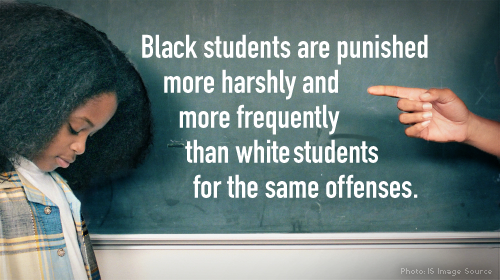Attorney General Holder echoed the Secretary Duncan's strong support:
A routine school disciplinary infraction should land a student in the principal's office, not in a police precinct. This guidance will promote fair and effective disciplinary practices that will make schools safe, supportive and inclusive for all students.
The
guidance addresses issues for which the
ACLU has long advocated . Some of the
key guiding principles for schools include:
- Training all school staff to apply school discipline policies and practices in a fair and equitable manner so as not to disproportionately impact students of color, students with disabilities, or at-risk students.
- Ensuring that school-based law enforcement are not involved in minor disciplinary matters.
- Ensuring that schools that do not have campus-based security avoid involving law enforcement or encouraging law enforcement techniques, such as arrest, citations, tickets, or court referrals in routine disciplinary matters.
- Prioritizing the use of evidence-based prevention strategies to promote positive student behavior.
- Instructing them that federal civil rights laws prohibit both different treatment and disparate impact based on race in the application of school discipline.

This guidance is
sorely needed . With the rise of law enforcement in our schools, the proliferation of zero-tolerance policies, and misuse of exclusionary school discipline, our nation's school discipline policies are fueling the school-to-prison pipeline by pushing children out of school. Research shows that African American students are
punished more harshly and more frequently than white students for the same offenses. Students with disabilities are also inappropriately and disproportionately disciplined. For example, according to Department of Education
data African American students comprise 15 percent of students in the collected data, but are 35 percent of the students who receive one suspension and nearly half of the students 44 percent who are suspended more than once. Over 50 percent of students in school related arrests or who are referred to law enforcement are black or Latino. Students with disabilities make up 14 percent of students in the collection, but are 76 percent of students who are physically restrained by adults in their schools.
Now, we have groundbreaking federal guidance instructing schools on their obligation to comply with our civil and
human rights laws (and an Administration committed to enforcement), which will help all school districts end these misguided, discriminatory policies. We commend the Departments of Justice and Education for taking this groundbreaking step.

